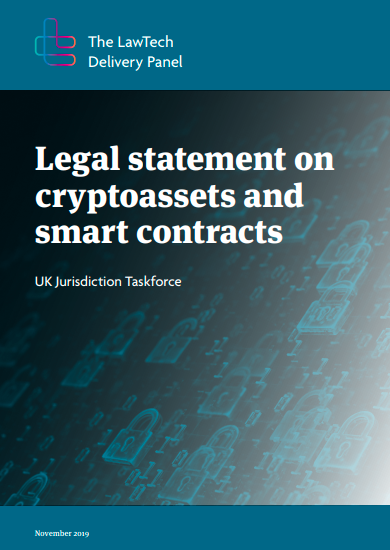
-
Find out about the future treatment of cryptocurrencies in Summary of The UK
jurisdiction taskforce of the LawTech Delivery Panel (LTDP) issued a statement
on Monday 18th Nov 2019. Conclusion given by this statement is: that
cryptoassets can be treated in principle as property; while smart contracts are
capable of satisfying the requirements of contracts under English law and are
enforceable by the courts.
Sir Geoffrey Vos the chancellor of the High Courts, stated that the launch of the legal statement is ‘ground-breaking’ and a ‘watershed for English law and UK’s jurisdictions’ and urged everyone to ‘take the half an hour needed to read the document’ even though it sounds nerdy and hard to understand’. LDTP tried to cover many kinds of cryptoassets and cryptocurrencies, which is arguably and create a legal framework which take into account them all.
The goal of the statement is to give regulations by which cryptoassets will be treated under English law, and to remove all uncertiances, and give confidence and legal certainty to users in the UK.
DOWNLOAD LEGAL STATEMENT ON CRYPTOASSETS AND SMART CONTRACTS
The taskforce
The UK Jurisdiction Taskforce is considered of various individual like solicitors, representatives of barristers, the judiciary, the Law Commission, the FCA and of city corporation groups.
The conclusion?
Cryptoassets:
Conclusion of this legal statement is that cryptoassets have all the key properties that makes it possible to treat them as properties, at least in the legal sense of the way. The properties like (i.e. intangibility, distributed transaction ledger use, and decentralisation) a did not disqualify them from being property. Cryptoassets cannot be treated as information as it’s obviously different from trade secrets, business ideas, private communications or personal information, as cryptoassets does not convey anything. They also cannot be transmitted freely in the way information can because of a private key.
Owner is any person which has acquired knowledge and control of a private key and we can consider that it’s the same as that person is lawfully being in possession of a tangible asset. Also like at any other property owner can give it to safe keeping or share ownership of it. Person can hold the key on behalf of another (an employer or client or on trust...) and ownership can be shared through multiple keys. A person who unlawfully acquires a key is not the lawful owner, in the same way as someone who steals property is not the legal owner of that property.
Cryptoassets will be classified as ‘things in action’ under the Sale of Goods Act 1979. The statement also concluded that legal security can be granted over cryptoassets, but they cannot have bailment over them, be physically possessed, and they are not negotiable instruments, or documents of title.
Governing Law:
Because cryptoassets are intangible; the location and therefore the law that will be applied is connected to the location of a controller. However, they were inconclusive on which law should be used and indicated that new legislation would be required.
Smart contracts:
We can see that the legal statement concludes that smart contracts are capable of satisfying the basic requirements of UK law and can be treated as contracts as they obey two key principles:- 1. Two or more parties have reached an AGREEMENT and intend to create a legal relationship,
- 2. There is CONSIDERATION for it,
Issues:
Cryptoassets:
This legislation miss part that defines certainty over the governing law, so parties may be more reluctant to transact. Unaddressed issues that can incur are:- 1. ownership now will depend on the circumstances (how a crypto asset is created) and
- 2. It can be difficult to identify a lawful owner in systems where owner is correlated to an anonymous address.
Smart contracts:
We are still uncertain how will several issues be dealt with by the Court and practitioners, for example:- ● which terms shall be considered part of the contract, does it include communications outside the code
- ● what are the mechanisms to handle any amendments to the terms
- ● incorporation of the accompanying explanations
- ● are the terms are fair and reasonable as contract is automatically executed
- ● who is responsible for coding errors
- ● ledgers are decentralised to deciding on point of failure or breaches is hard and this is closely connected to jurisdictional issues like performance of contract
- ● there is also a possibility of mismatch of what was agreed and what code will do this is also connected to the performance of contract.
What’s next?
EU’s Fifth Money Laundering Directive will be required form 10 January 2020. The Directive will and a responsibility for anti-money laundering supervision to the FCA’s. That is they will do the anti-money laundering and counter terrorist financing (AML/CTF) supervision to all cryptoassets that can be defined as UK based.
This means that finally cryptoasset businesses in the UK will have a regulations framework that will regulate their status. Acceptance of smart contracts by the Court will pave a way to development in interpretation, make them more widespread and increase public confidence.
Conclusion:
This is a good sign that the UK is embracing the growing market of cryptoassets, they have recognised that it’s of paramount importance for UK legal and financial infrastructures to facilitate these advances and to ensure its proper regulation to promote it’s development.
Key takeaway is the conclusion that English law is flexible and able to deal with technological developments. The LTDP presents English legal system leader in technological advances, this will be well received my cryptocomunity.
Stay tuned!
Aleksandar JELIC